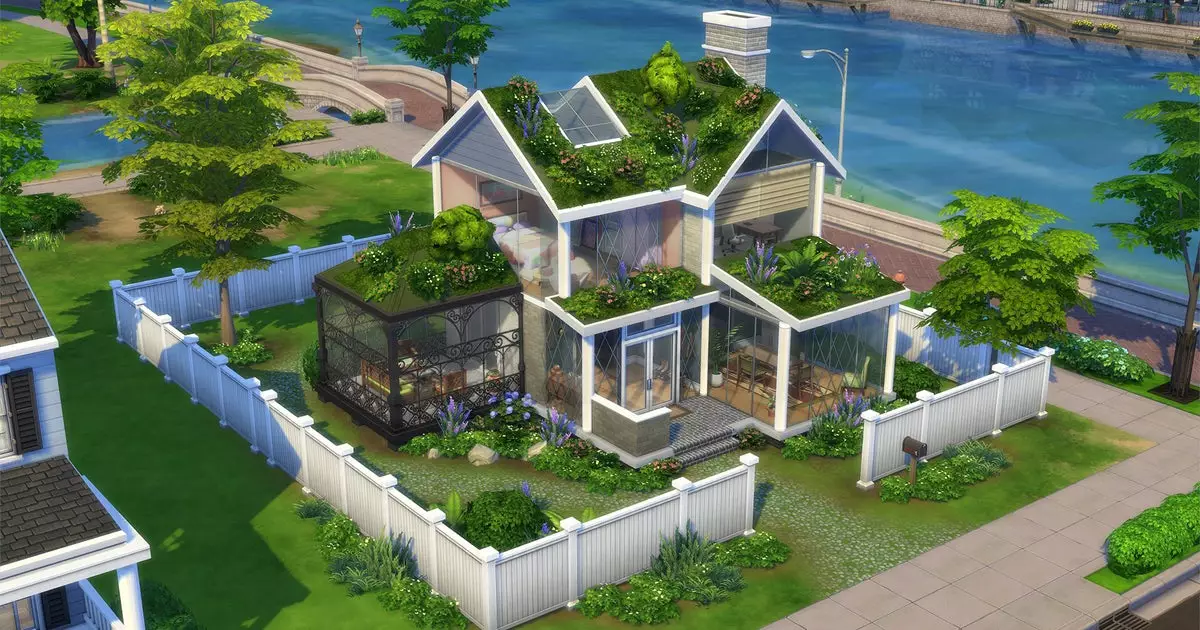The Sims 4 has long celebrated its claim to simulate life in a charming, albeit simplified, manner. It offers players a sandbox where they can indulge in creative storytelling, house-building, and character development. However, recent updates reveal a disturbing shift from the game’s foundational premise of personal privacy and freedom to an environment that borders on voyeuristic experimentation. The introduction of transparent glass walls—no longer confined to decorative purposes—allows for living spaces that are as exposed as a fishbowl. While some may see this as an innovative aesthetic choice, it also raises profound questions about ethical boundaries in virtual spaces. Are we fostering a culture of transparency, or are we secretly normalizing invasive oversight and intrusive voyeurism, even in simulated worlds? The developers seem unwittingly to be encouraging a disturbing level of exposure, blurring the lines between privacy and voyeurism for the sake of novelty.
The Ethical Dilemma of Creating ‘Glass Prisons’
Inspecting the new features through a critical lens exposes a troubling trend: the potential for players to construct virtual environments that resemble confinement chambers. The screenshots circulating on social media show players creating transparent enclosures that resemble prisons or cages. Although these are just creative expressions within a game, they echo larger issues from real-world debates about surveillance and control. The playful act of building a “glass house” suddenly becomes an unsettling metaphor for voyeurism—watching inhabitants without barrier or barrier’s intent. It prompts uncomfortable reflection on how digital tools facilitate the normalization of invasive observation. The game’s mechanics now provide the means for cruelty to be more visually explicit, taking away the previous discretion that allowed players to imagine or forget the discomfort of constrained privacy. Is this the evolution we want in a life simulation, or a dangerous step toward desensitization regarding personal autonomy?
The Flimsiness of Simulated Boundaries and Creative Freedom
Furthermore, the addition of glass walls, while framed as creative options—like building greenhouses or modern aesthetic homes—undermines the fundamental concept of boundary-setting in gameplay. Transparency as a design choice isn’t inherently problematic; it can foster innovative builds and open spaces. However, the game’s own community has demonstrated that players have long exploited transparency for more sinister purposes, such as creating “invisible” walls or traps. The developer’s decision to formalize these features suggests a misunderstanding of the social implications of boundary representation—pushing the idea that walls are optional, or perhaps unnecessary, in virtual life. This could inadvertently reinforce the notion that ‘privacy’ is superficial or obsolete. What was once a tool for creative flexibility now risks becoming a catalyst for ethical insensitivity among players, as the boundaries of digital empathy continue to erode.
Plants on Roofs and the Illusion of Care
The recent introduction of roof-top plants might seem harmless—a simple aesthetic addition to enhance the realism and beauty of virtual homes. Yet, it highlights a broader disconnect: while players can adorn rooftops with hydrangeas and succulents, these additions carry a tacit assumption that virtual inhabitants are mere props for aesthetic pleasure. It’s an ironic commentary on how the simulation blurs the line between genuine care and superficial decoration. In real life, caring for plants on roofs involves effort, thoughtfulness, and respect for the living things involved. But in The Sims 4, it’s just a matter of clicking and placing, an easy visual upgrade that obscures the deeper ethical questions of responsibility and stewardship—concepts that are, frankly, grossly trivialized in this digital realm.
Gameplay Mechanics and Virtual Morality—A Troubling Shift
Beyond architecture and aesthetics, the update also alters gameplay dynamics—introducing systems like the new food inventory that will automatically dispose of expired items. While meant to streamline management, it subtly influences how players perceive responsibility and care within the game. Setting aside the humorous notion of “feeding and neglecting your Sims,” it’s worth considering whether these tweaks diminish players’ engagement with their characters’ well-being, reducing life to a series of automated systems. Furthermore, the update’s menu improvements and bug fixes, though seemingly benign, contribute to a larger narrative: the move toward making the game more convenient may also be devaluing the depth of storytelling and moral decision-making that once characterized The Sims. Is the pursuit of simplicity in interface eroding the complexity needed for meaningful virtual experiences? The answer seems increasingly evident as the game’s boundaries continue to stretch beyond entertainment into a reflection of contemporary concerns about privacy, control, and ethical responsibility.

